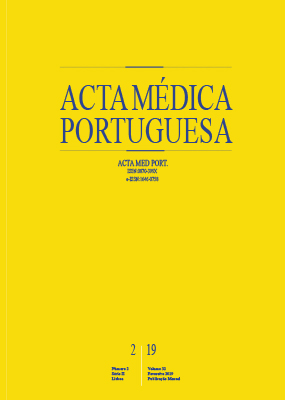Chronic Urticaria in the Real-Life Clinical Practice Setting in Portugal: Baseline Results from the Non-Interventional Multicentre AWARE Study
DOI:
https://doi.org/10.20344/amp.9496Keywords:
Chronic Disease, Cost of Illness, Health Resources, Portugal, Quality of Life, UrticariaAbstract
Introduction: There is a paucity of information regarding chronic urticaria patients’ care in a real-world setting. The objective of this study was to report and evaluate the baseline characteristics of Portuguese chronic urticaria patients refractory to H1-antihistamines included in the AWARE study.
Material and Methods: This is a non-interventional cohort study. Adult patients with a diagnosis of chronic urticaria with symptoms for at least two months, refractory to H1-antihistamines, consulting one of the 10 participating urticaria centers throughout Portugal have been included in the study. Baseline sociodemographic data, medical history, clinical parameters, medication, weekly urticaria activity score, and dermatology quality of life index have been collected.
Results: Seventy six patients were included, of which 76.3% were women. The majority of patients had a diagnosis of chronic spontaneous urticaria (88.2%) and 39.5% had angioedema. Around 91.0% of patients were medicated with non-sedative H1-antihistamines and 35.4% with a third line therapy. Median dermatology quality of life index was 5.0 and median weekly urticaria activity score was 13.0.
Discussion: The baseline results suggest that patients with chronic urticaria refractory to H1-antihistamines are being under-treated in the real-world setting.
Conclusion: The AWARE study demonstrates the real impact of chronic urticaria on Portuguese patients refractory to H1-antihistamines treatment, and 30% report a very large or extremely large deleterious effect on their quality of life. The follow-up of these patients will allow evaluating strategies aimed at optimizing disease control.
Downloads
Downloads
Published
How to Cite
Issue
Section
License
All the articles published in the AMP are open access and comply with the requirements of funding agencies or academic institutions. The AMP is governed by the terms of the Creative Commons ‘Attribution – Non-Commercial Use - (CC-BY-NC)’ license, regarding the use by third parties.
It is the author’s responsibility to obtain approval for the reproduction of figures, tables, etc. from other publications.
Upon acceptance of an article for publication, the authors will be asked to complete the ICMJE “Copyright Liability and Copyright Sharing Statement “(http://www.actamedicaportuguesa.com/info/AMP-NormasPublicacao.pdf) and the “Declaration of Potential Conflicts of Interest” (http:// www.icmje.org/conflicts-of-interest). An e-mail will be sent to the corresponding author to acknowledge receipt of the manuscript.
After publication, the authors are authorised to make their articles available in repositories of their institutions of origin, as long as they always mention where they were published and according to the Creative Commons license.









